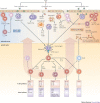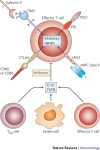Immunity and immunopathology to viruses: what decides the outcome?
- PMID: 20577268
- PMCID: PMC3899649
- DOI: 10.1038/nri2802
Immunity and immunopathology to viruses: what decides the outcome?
Abstract
Many viruses infect humans and most are controlled satisfactorily by the immune system with limited damage to host tissues. Some viruses, however, do cause overt damage to the host, either in isolated cases or as a reaction that commonly occurs after infection. The outcome is influenced by properties of the infecting virus, the circumstances of infection and several factors controlled by the host. In this Review, we focus on host factors that influence the outcome of viral infection, including genetic susceptibility, the age of the host when infected, the dose and route of infection, the induction of anti-inflammatory cells and proteins, as well as the presence of concurrent infections and past exposure to cross-reactive agents.
Conflict of interest statement
The authors declare no competing financial interests.
Figures



References
-
- de Martel C, Franceschi S. Infections and cancer: established associations and new hypotheses. Crit. Rev. Oncol. Hematol. 2009;70:183–194. - PubMed
-
- Pichlmair A, Reis e Sousa C. Innate recognition of viruses. Immunity. 2007;27:370–383. - PubMed
-
- Iwasaki A, Medzhitov R. Toll-like receptor control of the adaptive immune responses. Nature Immunol. 2004;5:987–995. - PubMed
Publication types
MeSH terms
Substances
Grants and funding
LinkOut - more resources
Full Text Sources
Other Literature Sources
Medical
Miscellaneous

